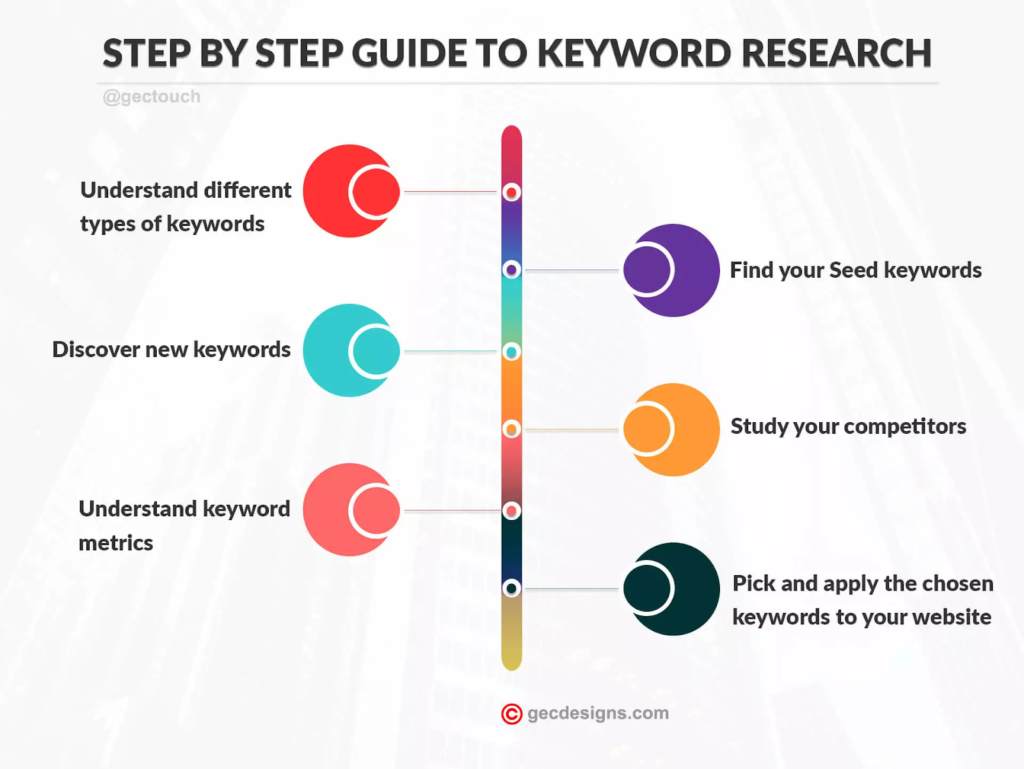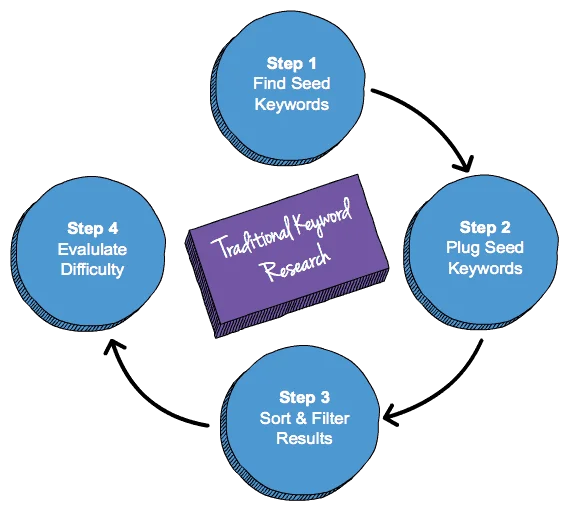The Ultimate Keyword Research Guide: Step-by-Step Strategies to Get More Traffic

As we all know, it’s difficult to compete for organic reach. Firstly, you need to know what’s appropriate to write, offering a distinctive perspective that no software can assist you with. Secondly, you must be aware of the Google searches for subjects pertinent to your customers.
Understanding how to do keyword research is just as crucial as developing a unique viewpoint like a content producer. Keyword research is an essential part of any successful digital marketing strategy. By finding the right keywords, you can optimize your content for search engines, attract more traffic to your website, and ultimately increase conversions and revenue.

In this ultimate keyword research guide, we will walk you through step-by-step strategies on “how to do keyword research” that will help you get more traffic to your website.
Strategizing Keyword Research
Strategizing keyword research involves a systematic, data-driven approach to identifying and prioritizing keywords that will bring the most relevant and valuable traffic to your website. Here are the steps on how to do keyword research to develop an effective keyword research strategy.
- Define your business objectives and target audience: Before you start the keyword research, understand your business objectives and target audience.
- Identify seed keywords: Seed keywords are the words or phrases most closely related to your business or industry. They can help you get started with your keyword research.

- Expand your keyword list: Once you have figured out how to find seed keywords for your research, you can use keyword research tools to expand your keyword list.
These include the following:
- Google Autocomplete: This feature suggests search queries related to your seed keywords as you type them into the search bar.
- Google Keyword Planner: This tool helps you find new keyword ideas, see their search volume, and estimate their traffic potential.
- Semrush or Ahrefs: These tools allow you to analyze your competitors’ organic search traffic and identify ranking keywords.
- Analyze keyword metrics: To determine the value of each keyword, you need to analyze its search volume, competition level, and relevance to your business objectives and target audience.
- Prioritize and optimize your keywords: Once you have analyzed your keyword metrics, you can prioritize the most relevant and valuable keywords for your business objectives and target audience. You can then optimize your website’s content and structure to target these keywords effectively.
- Monitor and adjust your strategy: Keyword research is an ongoing process, and it’s essential to regularly monitor your website’s traffic and search rankings. You can use analytics tools like Google Analytics to track your website’s performance and adjust your keyword strategy accordingly. Keep an eye on your competitors’ keyword strategies and update your strategy based on new trends and changes in the market.
The Importance of Keyword Research
Keyword research is important for several reasons:
- Improves Search Engine Optimization (SEO): By identifying the keywords your target audience is searching for, you can optimize your website’s content and structure to rank higher in search engine results pages (SERPs). This can increase the visibility and accessibility of your website, resulting in more organic traffic.
- Enhances content relevance: Keyword research allows you to understand your target audience’s search intent and interests. By using the right keywords in your content, you can create relevant and informative content that satisfies your audience’s search intent and leads to higher engagement, lower bounce rates, and higher conversions.

- Boosts PPC advertising: Keyword research is also important for pay-per-click (PPC) advertising. By targeting the right keywords in your PPC campaigns, you can increase the relevance and quality of your ads, resulting in a higher click-through rate (CTR), lower cost per click (CPC), and higher conversion rates.
- Provides insights for business strategy: Keyword research can also provide valuable insights into your target audience’s interests, preferences, and behavior. This information can help you understand your market better and adjust your business strategy accordingly.
Overall, keyword research is essential for driving relevant and valuable traffic to your website, improving your search engine rankings, and achieving your business objectives.
How To Find Keywords For SEO
If you are wondering how to find keywords for SEO, it can be done in a variety of ways. Finding out whether you’re able to score in the 10 most popular search engine results by evaluating every SERP’s leaderboard difficulties constitutes the most common method for selecting a keyword.
SEO is somewhat about that. Finding the Ideal keyword, however, is more complicated than simply considering ranking potential. You need to keep these three aspects in mind when choosing the right keywords concerning your blog’s writing:
- Ranking possibilities
- Company objectives
- Specialty and brand relevance.
Your domain must be authoritative and relevant to its content if you wish to rank well in Google. Therefore, the website’s material ought to go beyond being a collection of unrelated subjects. Choose your specialty, look up all the associated keywords, then write content that addresses these subjects.
Establish a distinction between your primary, secondary, or supporting keywords. The most important phase of keyword research begins here. Look for related keywords for each article that you create to reduce work, lo. Keep an eye out for any keywords that are comparable to your primary keyword. Just so your post can appear for a multitude of keywords as well as bring in all the engagement, be sure to capture each one.

Other questions you should be seeking answers to are, “How to find long tail keywords?” and “How to find low competition keywords?” The far more popular and fiercely competitive keywords typically are called ‘head keywords’ since they receive the most searches. ‘Long-tail keywords’ aren’t typically common, but are far more specialized. They have lower search volumes but often convert significantly since consumers using these have quite a specific demand.
Since they’re useful for your supplementary websites and a fantastic beginning point for just about any new website that can’t quite compete with major players, you require these keywords as well as the answers to your inquiries. They are advantageous for sales due to the increased conversion rate.
In Conclusion
Keyword research is a crucial component of any successful SEO strategy. By identifying and targeting the right keywords, you can attract more traffic to your website and improve your search engine rankings. This ultimate keyword research guide on “how to do keyword research” has provided you with a step-by-step approach to conducting effective keyword research, including the use of various tools and techniques to find the most relevant and valuable keywords for your business.
Remember to keep in mind your target audience and their search intent, and use long-tail keywords to target specific niche topics. Continuously monitor and update your keywords to ensure that you stay ahead of the competition and adapt to changes in search engine algorithms.
By implementing these strategies and making keyword research a regular part of your SEO efforts, you can drive more traffic, increase your online visibility, and ultimately grow your business.
FAQs
Long-tail keywords are more specific and less competitive than short-tail keywords. To find long-tail keywords, use tools such as Google Autocomplete, Google Trends, and Google Search Console. These tools provide insights into the search queries and phrases that people use to find information related to your business.
Keyword competition refers to the number of websites that are already ranking for a particular keyword. To analyze keyword competition, use tools such as Ahrefs or SEMrush to identify the domain authority and backlink profiles of your competitors. This information can help you to determine the level of competition for a particular keyword and adjust your SEO strategy accordingly.
Keyword research should be an ongoing process as search trends and user behavior are constantly changing. It is recommended to review and update your keyword research at least once a quarter or whenever there are significant changes in your industry or target market.
Latest Blogs
Explore how Google’s 2025 AI search updates triggered ranking chaos. Learn actionable strategies to adapt your SEO for AI Overviews, zero-click searches, and SERP volatility. Stay ahead now.
Learn how to rank on AI search engines like ChatGPT, Perplexity, and Gemini by optimizing your content for authority, structure, and relevance. Stay ahead in AI-driven search with this strategic guide.
Explore the best healthcare SEO services for your medical practice. Improve online visibility and effectively reach more patients in need of your services.
Get your hands on the latest news!
Similar Posts

Content Analytics
8 mins read
Google I/O 2025: AI Search Shake-Up & Ranking Volatility

SEO
5 mins read
Top 10 Agencies for Banking and Financial SEO Services Industry

SEO
4 mins read